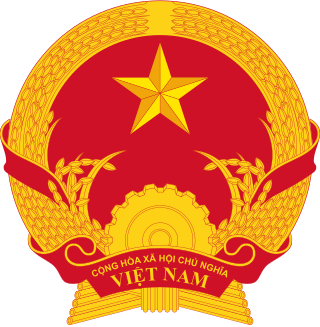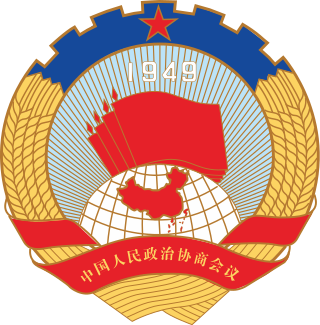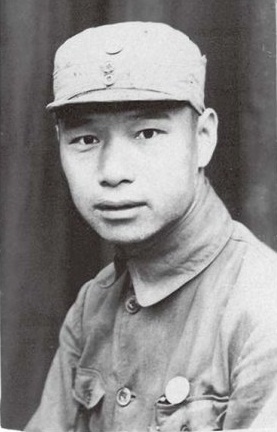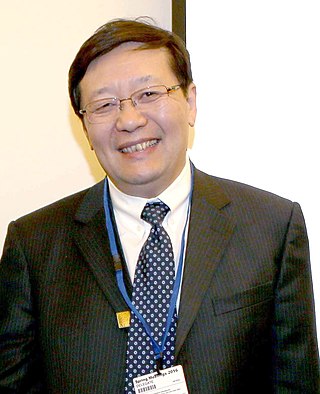
The politics of Vietnam is dominated by a single party, the Communist Party of Vietnam (CPV). The President of Vietnam is the head of state, and the Prime Minister of Vietnam is the head of government, both of these are separate from the General Secretary of the Communist Party of Vietnam who leads the Communist Party and is head of the Politburo and the Central Military Commission, thus the General Secretary is the de facto supreme leader of Vietnam. Executive power is exercised by the government and the President of Vietnam. Legislative power is vested in the National Assembly of Vietnam. The Judiciary is independent of the executive. The parliament adopted the current Constitution of Vietnam, its fifth, on 28 November 2013.

The premier of the State Council of the People's Republic of China, commonly called the premier of China, is the head of government of China and leader of the State Council. The premier is the second-highest ranking person in China's political system, under the general secretary of the Chinese Communist Party/president of China, and holds the highest rank in the civil service of the central government.

The Central Military Commission (CMC) is the highest national defense organization in the People's Republic of China, which heads the People's Liberation Army (PLA), the People's Armed Police (PAP), and the Militia of China.

The Chinese People's Political Consultative Conference, also known as the People's PCC or simply the PCC (政协), is a political advisory body in the People's Republic of China and a central part of the Chinese Communist Party (CCP)'s united front system. Its members advise and put proposals for political and social issues to government bodies. However, the CPPCC is a body without real legislative power. While consultation does take place, it is supervised and directed by the CCP.

The Central Foreign Affairs Commission is a commission of the Central Committee of the Chinese Communist Party (CCP) that exercises general oversight on matters related to foreign affairs. It is currently chaired by CCP General Secretary and President Xi Jinping, with Premier Li Keqiang as its deputy leader. The main execution body of the commission is the General Office, with the director of the Office being China's top diplomat, currently Wang Yi. Since 1993, the leader of the group had also served as General Secretary of the Chinese Communist Party and President of the People's Republic of China.

Ji Pengfei was a Chinese politician.

The Ministry of State Security is the principal civilian intelligence agency of the People's Republic of China, responsible for counterintelligence, foreign intelligence and political security. Its military counterpart is the Intelligence Bureau of the Joint Staff Department. Described as one of the most secretive intelligence organizations in the world, it is headquartered in Beijing with subordinate branches at the provincial, city, municipality and township levels throughout China.

The Government of the People's Republic of China is an authoritarian one-party political system in the People's Republic of China under the exclusive political leadership of the Chinese Communist Party (CCP). It consists of legislative, executive, military, supervisory, judicial, and procuratorial branches. The constitutional head of government is the premier, while the de facto top leader of government is the CCP general secretary.

The vice president of the People's Republic of China, commonly called the vice president of China, is a senior position in the government of the People's Republic of China. The incumbent vice president of China is Han Zheng, who took office in 2023.

The Ministry of Foreign Affairs of the People's Republic of China is the first-ranked executive department of the State Council of the People's Republic of China, responsible for the country's foreign relations. It is led by the Foreign Minister, currently Qin Gang, who serves as the nation's principal representative abroad. The ministry is headquartered in Chaoyang District, Beijing, the country's primary diplomatic quarter.

Wu Xueqian was a Chinese politician and diplomat who served as the Foreign Minister and Vice Premier of the People's Republic of China.

Lou Jiwei, is a Chinese politician, and current director of the 13th CPPCC Foreign Affairs Committee. Lou was Chairman of China's National Council for Social Security Fund, Minister for Finance, Chairman of China Investment Corporation and Central Huijin Investment, Vice Minister of Finance of China and Vice-Governor of Guizhou.

Zhang Yesui is a Chinese diplomat who served as the Vice Minister of Foreign Affairs and Party Committee Secretary for the People's Republic of China. He was formerly the Chinese Ambassador to the United States. He has previously served as Permanent Representative of China to the United Nations in New York City.

The Ministry of National Defense of the People's Republic of China, or the "National Defense Ministry" for short, is the second-ranked cabinet level executive department under the State Council. It is headed by the Minister of National Defense.

The Cabinet of Democratic People's Republic of Korea or North Korea (Naegak) is, according to the Constitution of North Korea, the administrative and executive body and a general state-management organ in the Government of North Korea. The Cabinet's principal newspaper is Minju Choson.
The organization of the Chinese Communist Party (CCP) is based upon the Leninist idea of democratic centralism.

Qin Gang is a Chinese diplomat and politician who has is currently a State Councilor of the People's Republic of China and the Minister of Foreign Affairs, making him China's second highest ranked diplomat after Chinese Communist Party (CCP) Politburo member Wang Yi. He previously served as Vice Minister of Foreign Affairs from 2018 to 2021 and most recently as Chinese Ambassador to the United States from 2021 to 2023.

Zhang Kunsheng is a former Chinese politician who from 2011 to 2015 served as Assistant Minister of Foreign Affairs. In 2015, Zhang was investigated by the Communist Party of China's Central Commission for Discipline Inspection and expelled from the Communist Party for allegedly violating codes of conduct, making him the most senior diplomat in the Ministry of Foreign Affairs to have been arrested during the anti-corruption campaign under Xi Jinping. Despite this, Zhang has yet to be formally accused of any crime as of 2020.

Phạm Bình Minh is a Vietnamese diplomat and politician serving as the Minister of Foreign Affairs from 2011 to 2021 and as Deputy Prime Minister of Vietnam from 2013 to 2023. Between September 2021 and his dismissal in January 2023, he also served as the Permanent Deputy Prime Minister, the most senior among the deputy prime ministers, in the Cabinet of Phạm Minh Chính. Minh was also a member of the Politburo of the Communist Party of Vietnam, the country's highest decision-making body, headed by General Secretary Nguyễn Phú Trọng.

The president of the People's Republic of China, commonly called the president of China, is the head of state and the second-highest political office of the People's Republic of China. The presidency is a ceremonial office and not the role with the real power in China's political system. However, the post has been held by the general secretary of the Chinese Communist Party and chairman of the Central Military Commission since 1993, who is China's de facto leader.































